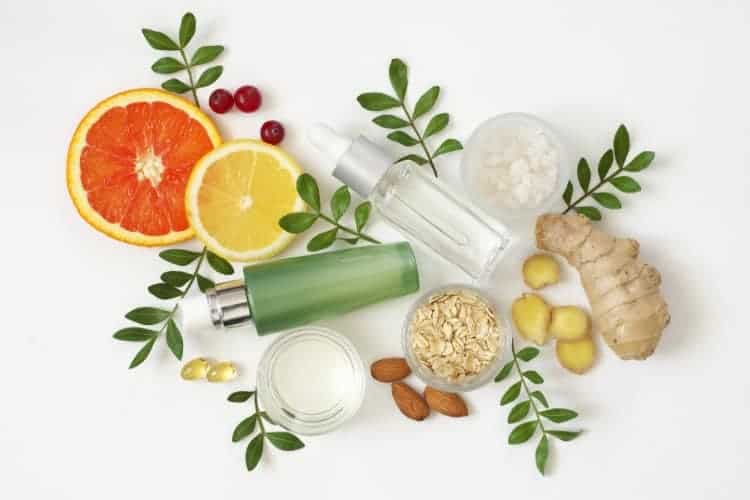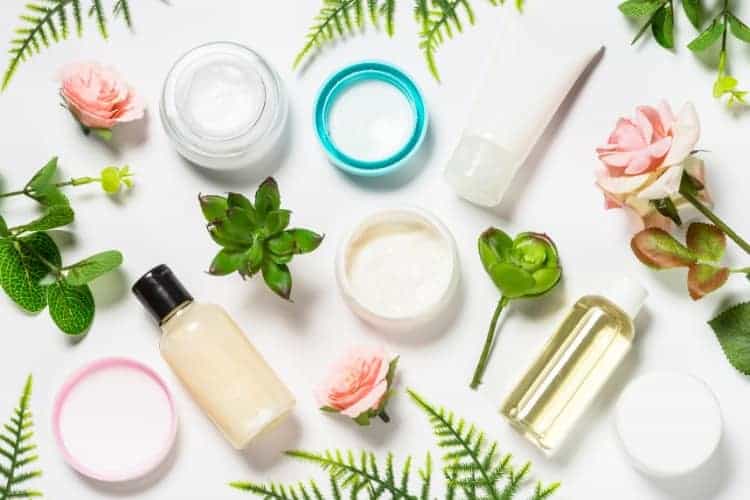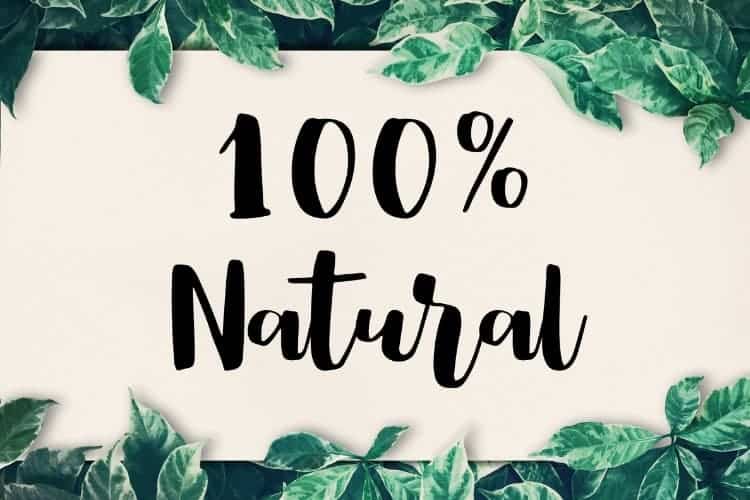
Is natural skin care better for your skin or is it just another trend that sounds great on paper, but fails when put to the test?
Generally speaking, natural skin care is better because it uses nutrient-rich ingredients that nourish, tone and cleanse the skin while maintaining a healthy balance of sebum (your skin’s natural oil) and moisture. However, as with conventional skin care, natural skin care products can also cause allergic reactions and other adverse reactions if used incorrectly. So, it’s important to know your ingredients, use only the best quality and follow the appropriate safety guidelines for their usage.
Now, even though this blog is all about natural beauty, I’ll be the first to admit that there are real pros and cons to consider when it comes to natural skin care.
Over the years I’ve done my own experimenting with both store bought and DIY natural skin care products. Some of those experiments have been great, while others were blah.
So, in this post I’m sharing the main pluses and minuses of adopting a natural skin care routine.
If you’re on the fence and wondering if natural skin care is really worth it, then I hope this post gives you an honest and unbiased overview of all things to consider.
6 BENEFITS OF NATURAL SKIN CARE PRODUCTS AND INGREDIENTS

1. Maintains The Health of Skin Microbiome
We now know that our skin has a microbiome consisting of millions of microorganisms (bacteria, viruses and fungi) that protect the skin and keep it healthy (source).
And we also know that external factors, such as pollution and skin care products, can affect the delicate balance of that microbiome.
In particular, harsh cleansers and soaps that contain ingredients like sulfates can throw your skin microbiome (source).
And this is one reason why switching to a natural skin care routine can improve the overall health of your skin.
Natural skin care products frequently use gentle surfactants (cleansing agents) that are less damaging to the skin.
And there are also DIY cleansers that can be made from honey, lemon juice and powders (like clays, ground oatmeal or ground beans). These types of cleansers are able to clean (not strip) the skin while also nourishing it.
2. No Harmful Artificial Fragrances
Another benefit of using natural ingredients or products is that you protect your skin and your entire system from the potentially harmful effects of synthetic fragrances.
You see, even though fragrance appears as just one ingredient on a product, it’s usually made up of hundreds of chemicals (source).
Yes, it takes that many artificial ingredients to make that body wash smell like pumpkin or passion fruit!
And many of those chemicals can be very drying to the skin, contribute to liver toxicity or mess with our hormones.
In fact, all the way back in 1986, the National Academy of Sciences released a report stating that 95% of chemicals in artificial fragrances are derived from petroleum.
Some of those petroleum derived chemicals include:
- Toluene: can irritate the skin and also lead to nausea and headache when inhaled; repeated exposure can be harmful to the nervous system (source).
- Benzene: classified as a carcinogen by the World Health Organization and the Environmental Protection Agency (source).
Aside from the above ingredients, phthalates are another concerning ingredient used in artificial scents.
Their main role is to help the scent adhere to the skin. But phthalates can also worsen asthma and skin allergies, as well as affect hormones (most notably reproductive health) (1, 2).
Why put yourself at risk when you can switch over to natural products that are scented with essential oils?
As long as the essential oils you’re using are good quality and you stick to the ones that are safe for skin, you’ll be better off.
3. Little to No Preservatives or Additives To Worry About
In order to make skin care products that last for years, companies have to use a wide variety of chemicals.
And while those chemicals do a great job of preserving the products, there’s also concern about their safety. Some of the ingredients that tend to raise eyebrows are:
- PEGs (polyethylene gycols): They have multiple uses, including acting as solvents, thickeners and moisture-carriers. In addition, PEGs can cause skin irritation and contribute to our overall toxic load. Furthermore, PEGs enhance absorption of other ingredients. So, if combined with other harmful ingredients, PEGs make it easier for those other toxins to enter your system (source).
- Formaldehyde-releasing preservatives: these are ingredients that release formaldehyde. Some of the ones used in cosmetics include DMDM hydantoin, quarternium-15 and diazolidinyl urea. These ingredients can cause skin and eye irritation, as well as contribute to hormone disruption and menstrual irregularities (3, 4).
- BHA and BHT: both are used as preservatives in products like moisturizers and lipsticks. BHA is listed as a carcinogen by the European Union, while animal studies indicate that BHT can affect the thyroid, motor skills and overall development (5, 6).
Why risk hormonal imbalance (which can contribute to oily skin, acne and dull skin) when you can use preservative-free natural products (or at least the ones that use less harsh preservatives)?
4. Feeds The Skin With Real Nutrients
Our skin needs vitamins, minerals, fatty acids, proteins and many other nutrients in order to thrive.
And the best way to get those nutrients is from good quality, natural ingredients that are minimally processed.
No matter how many lab-made chemicals you put on your skin, it’s very hard to get the full spectrum of nutrients that are necessary for glowing skin.
5. Less Effort Required to Address Multiple Skin Issues
With natural ingredients, you can easily target multiple skin issues at once.
For example, honey alone works to reduce redness, soothe itching, dry up pimples and moisturize the skin.
As for clays, they balance oil and moisture, cleanse the skin, remove impurities and brighten the skin.
Just using one of these ingredients on a regular basis can start to turn your skin around in a multitude of ways!
And if you want to have some fun, you can even combine them to make your own unique blend…which brings us to the last benefit…
6. Customized Skin Care Just For You
This benefit really only applies if you choose to make your own skin care products at home.
Now, that might seem like a daunting task, but…have you ever bought a product because the front label said it contains a special ingredient you’ve been dying to try?
Then you got home, read the ingredients and realized that the ingredient you were excited about is last on the list? So, basically you threw your money out the window with that purchase?
You never have to experience that level of frustration again if you DIY your products.
Homemade natural skin care gives you the flexibility to include only the ingredients you like.
And with the help of essential oils you also get to customize how they smell (or skip them altogether if you’re sensitive to fragrance).
5 REASONS WHY “ALL NATURAL” SKIN CARE ISN’T ALWAYS THE BEST CHOICE

1. The Term “Natural” Is Unregulated
As consumers, we often associate the term “natural” with clean, healthy, or non toxic.
But sadly, some beauty products labeled “natural” can be just as synthetic as conventional products.
And this happens because the term “natural” is not regulated by the FDA or any other governing body.
So, that means products can still contain toxins or synthetic chemicals and be labeled “natural.”
And the same goes for products that claim to be “organic.” It doesn’t mean that all of the ingredients are in fact organic.
So, is there any label you can actually rely on?
At this point the only thing you can rely on is the official USDA Organic seal.
Companies can only use that seal if all the ingredients in the product were organically grown.
But having said that, you can still have some not-so-good-for-you ingredients that are extracted from organic ingredients.
And this brings us to the next important point…
2. You Have To Know Your Ingredients
Since there are no regulations around the use of the term “natural, the only way to make sure you’re getting what you pay for is to read the ingredients list.
And that means you have to become familiar with ingredients. That way you know which ones are truly natural or non-toxic.
And you’ll also have to decide for yourself whether you’re willing to compromise when it comes to some toxins or whether you want everything to be 100% clean. That’s a personal choice we all have to make.
Now, this is all extra work on your part because you have to find books, blogs and other resources (like the Environmental Working Group) to help you navigate this crazy maze.
If you’re a geek like me, you might enjoy this process! But if not, then it becomes tedious.
So, just something to keep in mind.
3. Natural Products Have A Shorter Shelf Life
Products that are truly natural and free of toxic preservatives will always have a shorter shelf life than conventional products
This is particularly true for products that you make at home.
Some DIY products may only stay fresh for a day or two (even when stored in the fridge) while others can last for months.
Generally, oil-based homemade products can last for months (as long as the oils don’t go rancid). As for water-based products then tend to spoil quicker because it’s much easier for bacteria to grow in water.
Now, when it comes to store-bought natural products, some companies use natural preservatives (like rosemary extract and vitamin E). They give the products a longer shelf life (compared to homemade stuff)
Basically: if you’re looking for a 5-year shelf life, natural products are not where it’s at 🙂
4. Allergic Reactions Can Still Occur
Mother nature has some of the most gentle, soothing and healing ingredients for skin. And she also has some unbelievably potent stuff that can burn and irritate the skin in seconds.
So, just because a product is natural doesn’t mean that it’s automatically hypoallergenic or non-comedogenic.
This is especially important if you decide to try homemade skin care products.
Make sure you’re using ingredients that are safe for the skin.
One group of products to be very mindful of is essential oils. A lot of skin care mishaps happen simply because we buy or make products that contain the wrong type of essential oils (or we use unnecessarily high amounts).
5. Natural Products Can Be Pricey
There’s sometimes an expectation that natural products should be cheaper than the synthetic ones. But that’s always the case.
Now, if you choose to make your own products, you can end up saving money because you’re buying the raw materials (usually in bulk).
However, if you’re going to rely on store-bought, then know that the natural beauty space is filled with both luxury and budget-friendly brands (same as with as chemical-based brands).
Also, keep in mind that based on the standards set by the beauty industry, some ingredients are just pricier and that’s not changing any day soon. So, if you want to use those ingredients (whether in your DIY blend or from a brand) there’s an investment to be made.
FAQs ABOUT “IS NATURAL SKIN CARE BETTER FOR YOUR SKIN“
Is DIY skincare safe?
As long as you’re using ingredients that are known to be safe for the skin, from reputable suppliers and you’re following the appropriate usage guidelines for those ingredients, then DIY skincare is totally safe.
How do you make skin products with essential oils?
The easiest and safest way to make skin care products with essential oils is to blend them with carrier oils. These carrier oils can be things like almond, apricot kernel, avocado or rosehip oil.
To learn more about which essential oils to use and how to use them, read this post on how to dilute essential oils for skin.
CONCLUSION
Overall, truly natural skin care uses ingredients that nourish and support the natural balance of the skin.
And when formulated correctly, these products won’t strip the skin of its natural oils, nor will they contain toxins that harm the skin, liver or other parts of the body.
As for how to get your hands on natural products, you have the option of making your own or buying them. Making your own products is more of a commitment, but it gives you full control over what goes on your skin. On the other hand, buying store bought products is very convenient, but you might still be exposed to some harmful chemical.
Which option you go with is totally up to you 🙂
I hope this post has helped you gain clarity on the pros and cons of natural skin care as a whole.
Related Posts:
Is Origins Skin Care Really Natural?
How To Add Rosehip Oil To Your Skin Care Routine: Quick Tips To Follow

